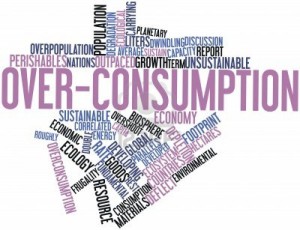Consumption Conundrum
Dec 9th, 2013 | By admin | Category: Consumption and WasteBy Suzanne York, www.howmany.org
A recent report by scientists from the National Research Council states that climate change is occurring gradually over the century and that its worst effects can be avoided by keeping emissions below a critical threshold.
Due to the burning of fossil fuels, industrial activity and deforestation, the scientists say the accelerating gas levels increase the risk of reaching various “tipping points,” leaving nature and society little time to react.
Focus on ConsumptionThat won’t happen until we (read: mainly wealthy nations) rein consumption. While population growth is often referred to as “the elephant in the room,” the issue of consumption is its twin.
Martin Hoerling, a meteorologist at the National Oceanic and Atmospheric Administration’s Earth System Research Laboratory, told the Los Angeles Times that “Our planet can’t sustain the comfort zone to which we’ve become adapted unless we change our pace of emissions.”
Other scientists have been speaking out on the need to consume less.
Kevin Anderson and Alice Bows-Larkin of the Tyndall Centre for Climate Change Research in England say many of the solutions proposed by world leaders to prevent “runaway global warming” will not be enough to address the scale of the crisis.
In an interview with Amy Goodman of Democracy Now!, Anderson said “And the levels of reduction we now need in carbon dioxide, and therefore energy consumption, are such that for many of us—for the wealthy of us, certainly—we can’t carry on as we’re going now. So we’ll have to consume less. And there’s absolutely no way out of that. The maths are absolutely clear. But it’s worth bearing in mind this is an equity issue, not just between the poorer south and richer north, but actually within our own countries, within the U.S.”
Anderson went on to say that “… I think that this is not an issue where we all have to see less consumption. It’s those of us that consume well above the average that will have to see significant reductions in the short to medium term…”
Making Smart Investments Today
It really comes down to what kind of world we will leave behind for the next generation. There is so much that we already know how to do that can improve the current global situation – invest more in clean/renewable energy, prioritize human well-being over endless economic growth and profits, promote family planning, and reduce poverty and inequity – to name a few.
Professor Tim Jackson, author of “Prosperity Without Growth,” put it this way in an interview with the UK Guardian:
But here’s the question, how is it possible for 7 billion people (soon to become 9 billion people) to consume the world’s resources at the rate we do in the west?
Short answer: it’s not.
So isn’t it our responsibility in the richest nations to think a bit more closely about our economies. And to ask the question: why do we still need growth when many of our material needs are already met? Couldn’t we find some other less materialistic, more meaningful way of living that treads more lightly on the earth?
Even in the aftermath of “Black Friday,” the answer is yes, we can, but we must find the political and public will to make it happen. The sooner we do so, the better.
Suzanne York is Senior Writer with the Institute for Population Studies.


